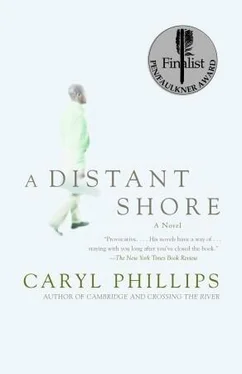Dorothy met Brian during her first year at university. A public schoolboy, he had a posh accent and confidence, two things that she knew she could never acquire, no matter how long she searched for them. For three years he protected her as she struggled with her degree in music, while he seemed to breeze through his course in mathematics, which he regarded as an unwelcome distraction from his passion for beer and rugby. As the time drew near for them to be unleashed upon the world, it was clear to their small group of friends that Brian would propose and they would be married, which, within a few weeks of graduation, they were. Brian’s parents tried to hide their disappointment, but her mother was delighted, for her ambition had never included a daughter at university, let alone a son-in-law whose family lived in a detached house. Her father, on the other hand, took his kneeling-pad down to the allotment and busied himself there. His youngest daughter had run off and was no longer in touch with home, and his eldest daughter was marrying into a world whose values he despised. Her father saw no reason to pretend, and she saw no reason to beg, and so they kept out of each other’s way. The night before the wedding her sister telephoned and wished her good luck, but said that Brian sounded as though he lacked a bit of spark. They had argued, but they did so without passion. She reminded Sheila that the wedding would not be the same without her, and her sister reminded her of the facts that she had recently shared with Dorothy during the university visit. They both fell silent. She decided to conclude the conversation by telling Sheila that after the wedding they would be moving to Birmingham, where Brian was brought up. Sheila laughed.
Long before she went to live there, she had already imagined Birmingham to be a city whose heart was a cold arterial clot of motorways, and whose suburbs were full of windows that displayed washable flowers. Brian was happy, for he had secured a job in a city-centre merchant bank, but soon after their marriage they discovered that they could not have children. They had every test possible, but the doctors claimed that they still did not know what was wrong, which of course meant that they probably did. After years of being prodded and probed they finally did discover the reason for their failure, and their GP was left with the sad task of persuading Brian to accept that the problem was his. However, her compassion quickly soured into anger as she began to hear about his petty affairs at the bank with backroom girls. Straight out of school, these were graceless, slightly dumpy girls still too naïve to be placed in front of the clientele, but who went positively weak at the knees at the thought of being pinned beneath a man who wore a suit and tie to work. She threw herself into her life as a teacher of music at the local secondary-modern school, and having proved her ability to tease tuneful sounds from their discordant souls, she was quickly transferred to the grammar school. This was a place where the parents expected, and where the headmaster expected, although she soon discovered that the pupils were as unfocused as the pupils at the supposedly inferior school. And then Brian’s affairs seemed to stop, and she realised that there must be somebody special. She herself had not been totally ignored. There had been staffroom flirtations; the head of physics idly pushing an arm through hers and looking at her in a particular way; and the cricket master forever offering his services as a driver to run her to a concert, or to the supermarket, or to anywhere that took her fancy. Once or twice a month a man would sit next to her on the bus and attempt conversation, but she knew that her days as an object of desire were firmly rooted in the past. She imagined that either pity or curiosity motivated these men, and it never occurred to her that there might be any possibility of her seriously pursuing a liaison beyond the one she endured with Brian.
He left the note on the kitchen table. It simply said, “Sorry.” At first she did not know what to make of it. She tried to remember the threads of their last argument. There was always an argument in the air, like an unresolved plot line from one of the television soaps whose omnibus editions he liked to watch at the weekends in his socks and sandals. But she could not remember any argument. She put down her bag and went upstairs to get out of her school clothes. Then she taught her private student, and after the hopeless boy had left, she began to prepare dinner. It was only when the light began to fade at 8:30 p.m. that she realised that her inability to locate the source of any argument was far more significant than she was acknowledging. In fact, there was a problem. She called his office, but there was no answer, just the office machine and his dry-toned voice. After a sleepless night in their oversized raft of a bed, everything was clarified. The letter arrived with the morning post. She recognised his handwriting and tore it open. He had gone to Spain with Barbara, whoever Barbara was. He was sorry, but he could not live this life, and it was killing him to pretend. He had to go, but he knew that she would be better off on her own without him. How did he know? she wondered. The selfish pig had walked out on nearly thirty years of marriage and was writing to her as though the only thing that he was guilty of was exchanging the wretched uncertainty of English weather for the calming predictability of blue sky and bright sunshine. She did not dress, nor did she leave the house. She telephoned the school and told them that she needed to take a week’s leave of absence because of a family crisis, and the headmaster’s secretary answered her in a voice which seemed to be taunting her with secret knowledge of the failure of her marriage. And then, sometime later the same day, having drunk a dozen cups of coffee, a decision was made to sell up and, at fifty years of age, start over again in the nondescript town that she had grown up in. She would leave Brian’s Birmingham and go home and find a position among her own.
Mahmood had listened attentively and occasionally raised an eyebrow, but she knew that hers was not a very interesting story. For the past five years she has lived in a neat semi-detached house and earned her daily bread as the music mistress at the grammar school that, soon after her return, abandoned all standards and became the local comprehensive. In the evenings she has become something of a television addict, watching programmes that she acknowledges have no value beyond the killing of dull time. Reality shows and court-room dramas are her speciality, but once in a while she can enjoy a documentary, particularly if it concerns animals. Meanwhile, in Spain, her former bank-manager husband runs a bed and breakfast (which he insists on calling a “pension’) on the Costa del Sol for “upmarket” British tourists. Football shirts are not encouraged, and fried breakfasts, not just continental cold plates, are offered. In fact, according to the promotional material that Brian so generously sent to her, fried breakfasts are the speciality of Barbara’s house. Apparently, even some of the bigger hotels don’t do “the works,” but at Brian and Barbara’s “Casa BeeBee” you can always get a fried breakfast. Having read the brochures, she immediately burned them. For five years she has lived alone, and each passing year she has watched herself age, the increased wrinkling of the skin between her breasts being her secret barometer of decrepitude. Last month the man on the bus asked to see her bus pass and she slapped the two-pound coin down so hard that she hurt her hand. Not turning heads is one thing, not being taken seriously is another thing altogether. And then one morning, as she felt herself finally coming to terms with the futility of years spent mourning a man whom she had never truly loved, she walked into the corner shop for her newspaper and the new owner, a doe-eyed Indian man, handed her a copy of the Daily Mail and took her money.
Читать дальше











![Карен Кингсбери - A Distant Shore [calibre]](/books/384306/karen-kingsberi-a-distant-shore-calibre-thumb.webp)
